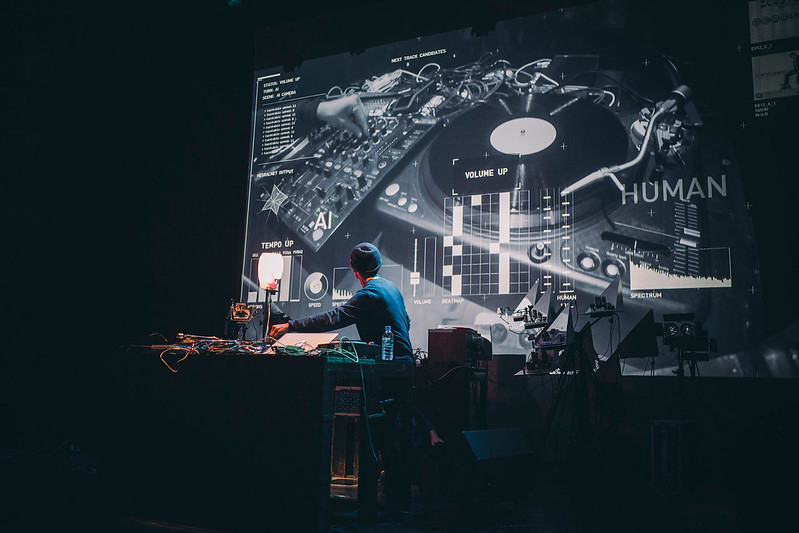The rapid expansion of AI technologies, exemplified by OpenAI's projected $5 billion annual revenues and the AI music market's growth from $300 million to $3 billion by 2028, has led to widespread concerns among European Musicians. The unlicensed use of copyrighted musical works, already has significant consequences, with 27% of music creators' revenues at risk and a potential economic damage of €950 million for the sector by 2028. As a result, 71% of creators say that fear AI might prevent them from earning a living in the future.
To tackle these concerns, GEMA, representing 95,000 members, has filed a landmark lawsuit in the Munich Regional Court, supported by prominent German musicians aiming to establish a fair compensation and licensing model, reflecting broader industry demands:
In a survey conducted a few months ago, 95% of creators said that they seek transparency about AI's use of copyrighted material, and 90% insist on consent and financial compensation.
--
The lawsuit
The lawsuit, filed with the Munich Regional Court on 13 November, targets OpenAI's US parent company and its European operating entity.
GEMA accuses OpenAI of systematically reproducing song lyrics from its members without obtaining licences or providing financial compensation. The legal action comes as the tech company rapidly expands, with projected annual revenues that could reach $5 billion by 2024.
“Our members‘ songs are not free raw material for generative AI systems providers‘ business models,” said Dr Tobias Holzmüller, CEO of GEMA, in a strongly worded statement. “Anyone who wants to use these songs must acquire a licence and remunerate the authors fairly.”
Prominent German musicians, including Kristina Bach and Rolf Zuckowski, Reinhard Mey, Inga Humpe, Thomas Eckert, Ulf Sommer and Peter Plate, support the case. They argue that their intellectual property has been exploited without their consent.
The case could set a critical precedent for how generative AI platforms interact with copyrighted creative works, potentially forcing significant changes in how these technologies source and use artistic content.
--
The GEMA AI charter
Basic principles for a constructive and fair interaction of human creativity and generative artificial intelligence.
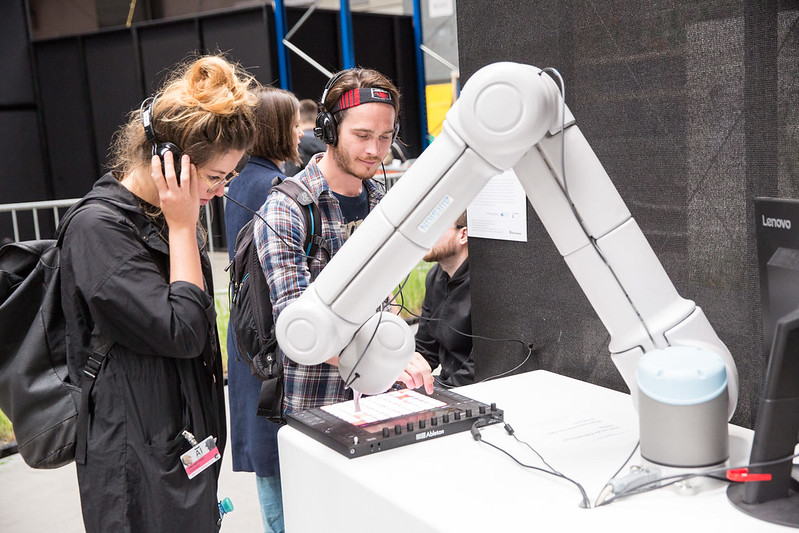
In September 2024, GEMA presented a generative AI licensing model that aims to ensure fair remuneration of music creators. Fair, regardless of whether their works are used in training systems, or in the production of new AI songs, or as part of AI-generated music content. The organization had previously informed AI model and system operators in writing that they would need to obtain a licence for the use of GEMA works.
Representing some 95,000 members in Germany and over two million rights holders worldwide, GEMA's approach signals a potentially transformative moment in the ongoing dialogue between technological progress and the rights of creative workers.
“The new technology presents us with fundamental legal questions that we absolutely must clarify. Our model procedure makes a decisive contribution to this” Dr Kai Welp, GEMA's General Counsel, emphasised in a statement.
The organization's AI Charter outlines ten core principles, including strong intellectual property protections to ensure that creators can share equitably in the value created by AI technologies.
--
#1: Digital humanism – where people take centre stage: The development of generative AI is obligated to the well-being of people.
#2: Protection of intellectual property: They promote creativity, cultural diversity and innovation.
#3: Fair participation in value creation: All parties involved in the value chain receive a fair share of the revenues.
#4: Transparency: AI providers act in a transparent manner.
#5: Negotiations at eye level: Responsible handling of the market position.
#6: Respecting moral rights: Each person must have the option to take swift and effective action against infringements of their moral rights.
#7: Respecting cultural diversity: Generative AI must not lead to cultural forms of expression and social trends being homogenised
#8: No bypassing of EU rules: AI providers must be reachable for EU legal requirements.
#9: Sustainability: Developing and running generative AI must be designed in a sustainable manner.
#10: Responsibility: AI providers must be aware of the impact of their technology and accept responsibility.
The Existential Challenge of AI in Music
A study by Goldmedia for GEMA and SACEM documents the profound impact of generative AI on the music industry.
The research, conducted between July 2023 and January 2024, paints a complex picture of opportunity but most importantly, existential challenge for music creators.
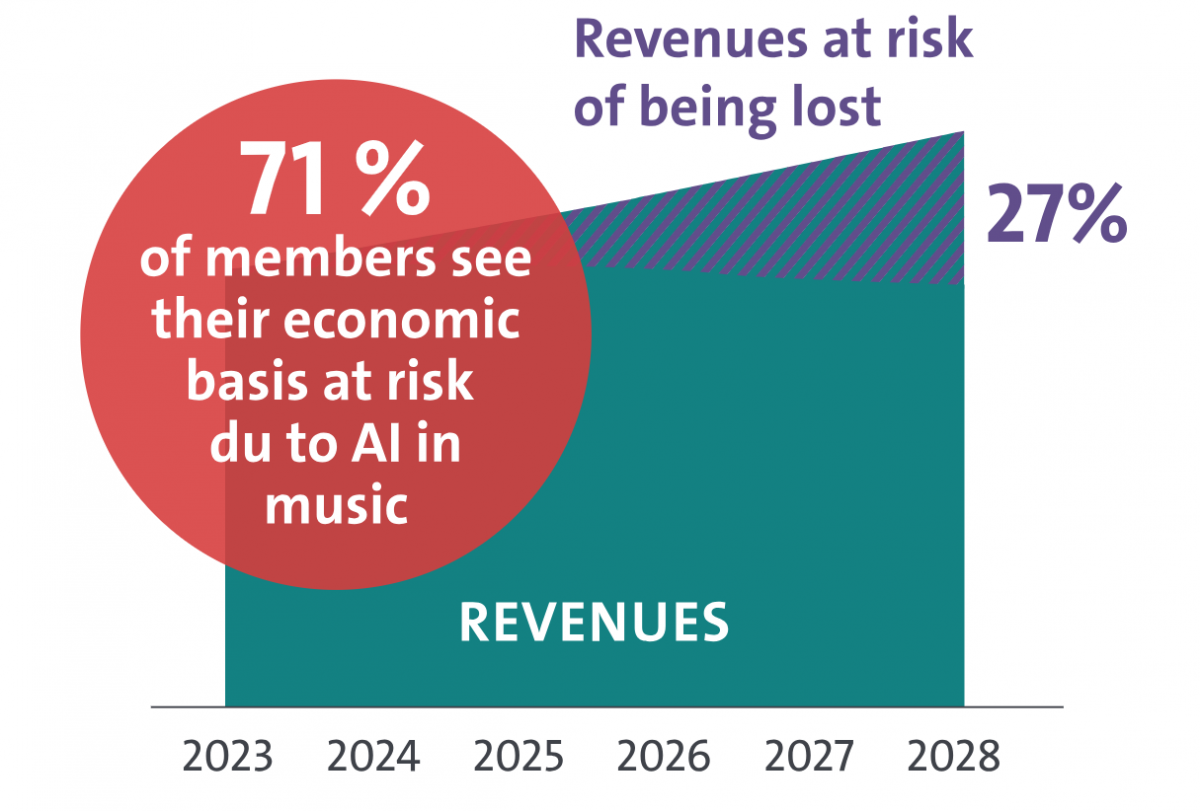
The study, which surveyed over 15,000 music professionals from GEMA and SACEM, revealed a generation grappling with technological disruption. While the market, currently valued at $300 million, is projected to explode to $3 billion by 2028, representing a tenfold increase that signals a “technological revolution”, creators income may be at great risk of decline.
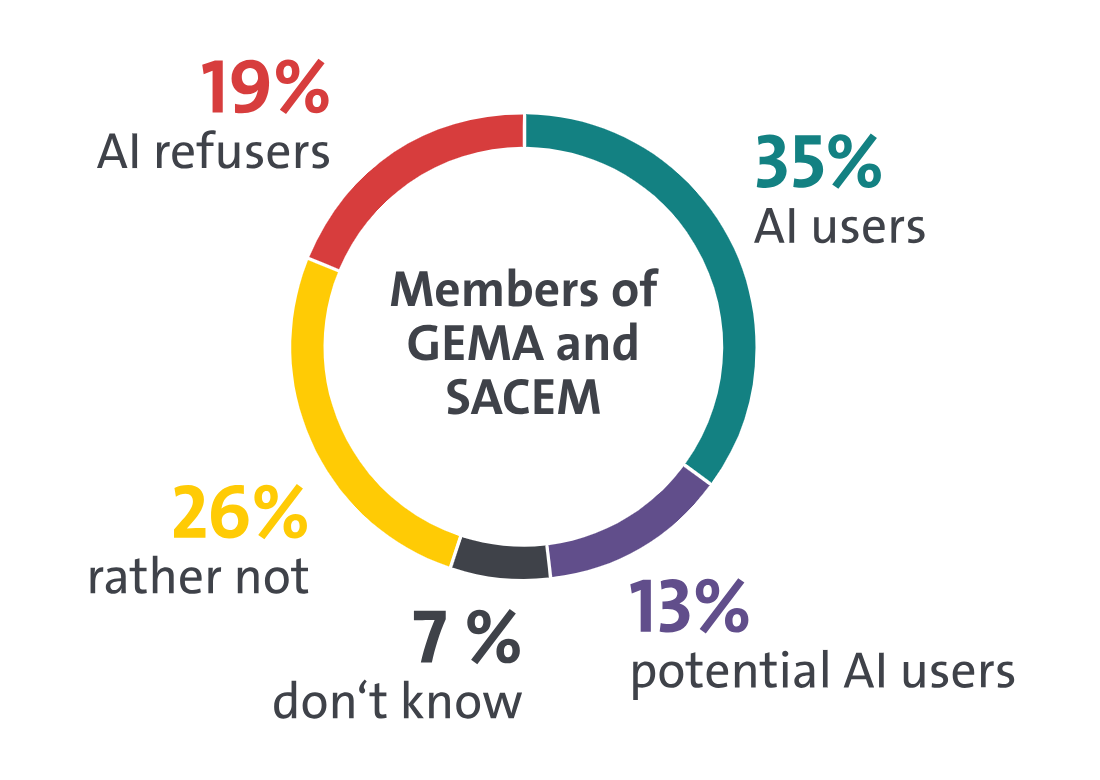
According to the study p to 27% of music creators' revenues could be lost, translating to a potential economic damage of €950 million in 2028 alone. Consequently, creators remain deeply ambivalent. Sixty-four per cent believe the risks of AI outweigh its potential benefits, with a staggering 71% expressing fear that AI could ultimately prevent musicians from earning a living.
As we have seen previously with digital technology applications, the generation gap is present here too: Thirty-five per cent of respondents had already integrated AI into their creative processes, with this number climbing to 51% among creators under 35. Electronic music, urban/rap, and advertising music emerged as the most AI-adaptive genres.
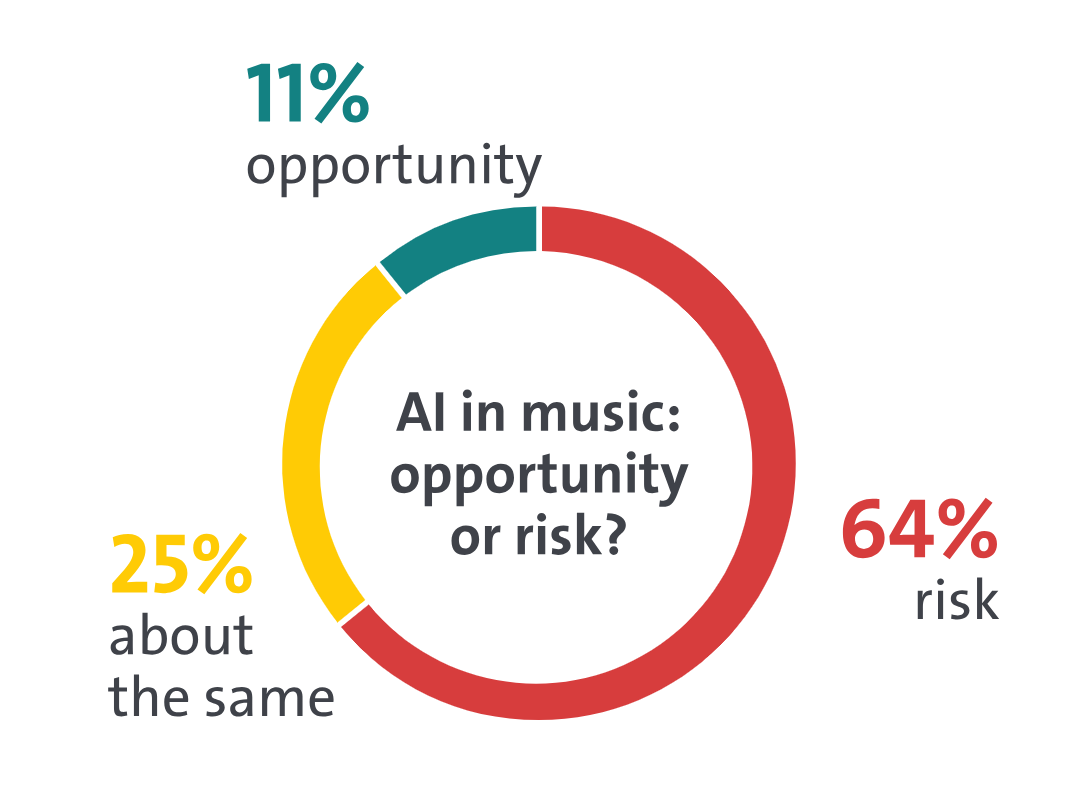
As electronic music pioneer Jean-Michel Jarre poignantly noted in the report: “AI is an opportunity for creators, but it is our responsibility, us Europeans, to define the ethical and economic framework in which intellectual property has to be respected.”
As a result of the above, the creators' message to policymakers is unequivocal. Ninety-five per cent demand transparency about AI's use of copyrighted material, while 90% insist on consent and financial compensation for their work.
Images Credits
1. Rakutaro Ogiwara, AIDJProject - A dialogue between AI and a human / Nao Tokui (JP), Shoya Dozono (JP), Ars Electronica, CC BY-NC-ND 2.0
2. Florian Voggeneder, Ars Electronica, CC BY-NC-ND 2.0








